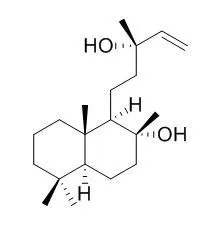Sclareol is a natural product initially isolated form Salvia sclarea which possesses immune-regulation and anti-inflammatory activities. However, the anti-osteoarthritic properties of Sclareol have not been investigated. The present study is aimed at evaluating the potential effects of Sclareol in interleukin-1β (IL-1β)-induced rabbit chondrocytes as well as an experimental rabbit knee osteoarthritis model induced by anterior cruciate ligament transection (ACLT).
METHODS AND RESULTS:
Cultured rabbit chondrocytes were pretreated with 1, 5 and 10 μg/mL Sclareol for 1 h and followed by stimulation of IL-1β (10 ng/mL) for 24 h. Gene expression of matrix metalloproteinase-1 (MMP-1), MMP-3, MMP-13, tissue inhibitors of metalloproteinase-1 (TIMP-1), inducible nitric oxide synthase (iNOS) and cyclooxygenase (COX)-2 was determined by quantitative real-time polymerase chain reaction (qRT-PCR). MMP-3, TIMP-1, iNOS and COX-2 proteins were measured by Western blotting. Enzyme-linked immunosorbent assay (ELISA) was applied for nitric oxide (NO) and prostaglandin E2 (PGE2) assessment. For the in vivo study, rabbits received six weekly 0.3 mL Sclareol (10 μg/mL) intra-articular injections in the knees four weeks after ACLT surgery. Cartilage was harvested for measurement of MMP-1, MMP-3, MMP-13, TIMP-1, iNOS and COX-2 by qRT-PCR, while femoral condyles were used for histological evaluation. The in vitro results we obtained showed that Sclareol inhibited the MMPs, iNOS and COX-2 expression on mRNA and protein levels, while increased the TIMP-1 expression. And over-production of NO and PGE2 was also suppressed. For the in vivo study, both qRT-PCR results and histological evaluation confirmed that Sclareol ameliorated cartilage degradation.
CONCLUSIONS:
Hence, we speculated that Sclareol may be an ideal approach for treating osteoarthritis. |






 Cell. 2018 Jan 11;172(1-2):249-261.e12. doi: 10.1016/j.cell.2017.12.019.IF=36.216(2019)
Cell. 2018 Jan 11;172(1-2):249-261.e12. doi: 10.1016/j.cell.2017.12.019.IF=36.216(2019) Cell Metab. 2020 Mar 3;31(3):534-548.e5. doi: 10.1016/j.cmet.2020.01.002.IF=22.415(2019)
Cell Metab. 2020 Mar 3;31(3):534-548.e5. doi: 10.1016/j.cmet.2020.01.002.IF=22.415(2019) Mol Cell. 2017 Nov 16;68(4):673-685.e6. doi: 10.1016/j.molcel.2017.10.022.IF=14.548(2019)
Mol Cell. 2017 Nov 16;68(4):673-685.e6. doi: 10.1016/j.molcel.2017.10.022.IF=14.548(2019)